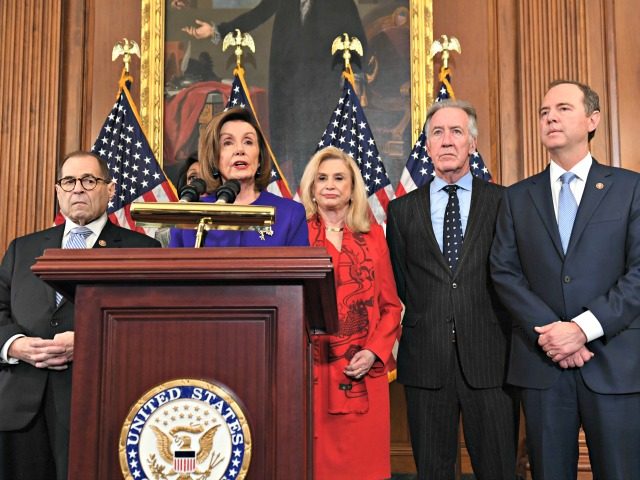On Tuesday, Democrats in the House of Representatives unveiled their long-awaited articles of impeachment against President Trump.
Instead of charging the president with articles that describe “treason, bribery, or other high crimes and misdemeanors,” as required by Article II, Section 3 of the Constitution, the Democrats offered much less. Neither of their two articles meets the constitutional standard for impeachment. The first article accuses the president of “abuse of power,” a charge so vague as to be meaningless.
Indeed, as I have explained before, in defining what would constitute an impeachable offense, the Founding Fathers avoided using the broad term “maladministration” in order to narrow what might be considered an impeachable offense and to guard against impeachment being used for partisan purposes. “Abuse of power” is a similarly vague concept that can mean just about anything.
But the second article of impeachment is even more absurd. The Democrats charged President Trump with “obstruction of Congress” (not obstruction of justice) because he declined to respond to their congressional subpoenas. Instead of responding, the president asserted executive privilege and invited the Democrats to make their case in court. President Trump maintained that his conversations with his advisers were entitled to the protection provided by Article II and the constitutional separation of powers.
That is exactly what a president is supposed to do if he believes Congress is not entitled to such information – assert executive privilege and let the courts decide whether or not the information is protected. Indeed, that is how the Nixon impeachment proceeded. In the landmark case of United States v. Nixon, President Nixon asserted executive privilege to protect the Watergate tapes against disclosure.
The Supreme Court recognized that executive privilege did protect “communications between high Government officials and those who advise and assist them in the performance of their manifold duties; the importance of this confidentiality is too plain to require further discussion. Human experience teaches that those who expect public dissemination of their remarks may well temper candor with a concern for appearances and for their own interests to the detriment of the decisionmaking process.” Nevertheless, the Court concluded on July 24, 1974, that under the circumstances of the case, the tapes were not protected. Sixteen days later, President Nixon resigned.
It’s utter nonsense for the Democrats to claim now that it’s an impeachable offense for Trump to resist a congressional subpoena and ask the courts to decide the matter. That is how the Constitution is supposed to work. If the executive and legislative branches of government disagree about whether certain information is protected by executive privilege, it is up to the judiciary to decide.
If the Democrats’ distorted view of the world were correct, then impeachable offenses would have occurred dozens of times in the past, under every president starting with Washington.
President Eisenhower asserted executive privilege the most frequently against congressional subpoenas, doing so 44 times. Reagan asserted the privilege three times, Clinton asserted it fourteen times, George W. Bush asserted it six times, and Obama asserted it once. President Trump has asserted it in three different contexts: the unredacted Mueller Report, his conversations concerning the addition of the citizenship question to the census, and in the current impeachment inquiry. And those numbers don’t include the many instances in which a White House signals that it will assert executive privilege, and Congress then declines to issue a subpoena.
Executive privilege exists for a good reason. Presidents need to have candid, unrestrained communications with their advisers, without fear that every word will be scrutinized by political opponents in Congress. That said, future Congresses will continue to challenge assertions of the privilege, sometimes with good reason. When those disagreements arise, it is the prerogative of the courts to settle the matter.
The House Democrats’ claim that the mere assertion of executive privilege constitutes an impeachable offense reflects their ignorance of both the Constitution and history. It’s going to be up to the Senate to make this clear. If they don’t, we can expect impeachment debacles to disrupt our lives with increasing regularity.
Kris W. Kobach was a professor of constitutional law during 1996-2011 at the University of Missouri-KC. He served as the Secretary of State of Kansas during 2011-2019. An expert in immigration law and policy, he coauthored the Arizona SB-1070 immigration law and represented in federal court the 10 ICE agents who sued to stop Obama’s 2012 DACA executive amnesty. He is currently a candidate for the U.S. Senate. His website is www.kriskobach.com.

COMMENTS
Please let us know if you're having issues with commenting.